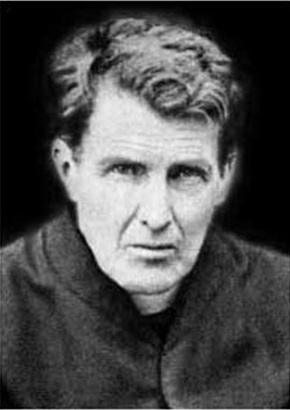We continue our reflections on the life of Fr John Sullivan who will be beatified this coming Saturday in Dublin. He was ordained with Fr Doyle on 28 July 1907 and his beatification is of direct relevance to this blog. His beatification is an important good news story for all of the Church here in Ireland which has suffered so much from (often self-inflicted) bad news for the past several decades. The beatification and canonisation of Irish people has the potential to be a morale boost – it highlights the important example of those who truly followed the compassionate and merciful path Jesus asked His disciples to walk. Local, and recent, examples are an important component of the new evangelisation. They give us models that instruct and inspire. And, if we cannot imitate the special gifts of Fr Sullivan, we can at least be inspired by the example of his intense love of God and the fruits that love bore in his life for the benefit of all those around him.
On Monday we gave an overview of Fr Sullivan’s life. Yesterday we looked at his life of asceticism. Today we will look at his service of the afflicted.
If there was one characteristic note about Fr Sullivan’s life, it would be his care for those who suffered.
Even before he entered the Jesuits he adopted the habit of visiting the sick in hospitals around Dublin. He was especially well known in hospitals for sick children and in what was called the hospital for “incurables”, which seems mostly to have been occupied by patients with cancer for whom there was little hope of recovery. He spent a long time in prayer with those who were sick, and, occasionally, they made almost inexplicable recoveries. Over time his fame as a “healer” began to grow.
Fr Sullivan spent most of his life as a priest in Clongowes Wood College in Kildare, and the locals developed a deep and enduring devotion to him. Not only did they come to visit him at Clongowes, but they also requested that he visit them in their houses and pray over them. It became a common sight to see Fr Sullivan trotting along or even cycling to visit the sick in the area – no distance or trouble was too much if it meant that he could help someone.
The following are just a few examples, of many, of cures attributed to him during his life. Note that these cures are not the reason for his beatification, nor is there always hard scientific evidence relating to most of them, as there always is when it comes to miracles for beatification and canonisation. But they are well attested by eye witnesses, and they show the mutual respect and devotion between Fr Sullivan and those who suffered.
Jeremiah Hooks was 12 years old and was afflicted with St Vitus’ Dance. he was unable to hold a knife or fork or even drink from a cup. Fr Sullivan prayed over him, and he was cured. However some time later he was frightened by a bull, and the symptoms returned. His father brought him back to Fr Sullivan, who, after praying over him a second time, told the father that he would be better and would never be afflicted again. When the boy returned home he was perfectly cured, and the disease never returned and was able to work on the railway for many years.
There was the case of a woman in Carlow with a long term swelling on her breast, which the doctors advised had to be surgically removed. Fr Sullivan said Mass for her; the next morning when she awoke the swelling had disappeared.
A Mrs Williams in Monkstown was told that she was going blind from cataracts. Fr Sullivan visited her and blessed her with a relic of Mary Aikenhead, the founder of the Irish Sisters of Charity. The cataracts disappeared and she had no more sight problems. A similar case happened in Rathfarnham in Dublin where a person had ulcers on the eyes for three years and was told that they would go blind. Fr Sullivan authoritatively told the patient that the doctors were wrong and to make a novena to our Lady of Lourdes and that a cure would happen on her feast. His prediction came true.
This was not the only example of his having a strange spiritual insight or intuition. There were many cases when he visited a person and predicted that they would not get better and that they would die, even in some cases that did not seem very serious at the time. There is also some evidence that he even had certain spiritual intuitions about those who came to him for confession.
Of course, much of this is obviously very specific to Fr Sullivan. We cannot copy his specific spiritual gifts. But we can imitate his practice of the virtue of charity and kindness towards others. He lived a simple and poor life, one that was simpler and poorer than it strictly needed to be, even with his vow of poverty. He gave any excess money, or any gifts of new clothing that he received, to the poor. He used to say that any friend of the poor is a friend of Christ. This is one of his great lessons for us.
Prayer through Fr Sullivan’s intercession:
God, you honour those who honour you.
Make sacred the memory of your servant John Sullivan, by granting through his intercession the petition we now make (name the petition) and hastening the day when his name will be numbered among those of your saints.
We make our prayer through Christ our Lord. Amen.

